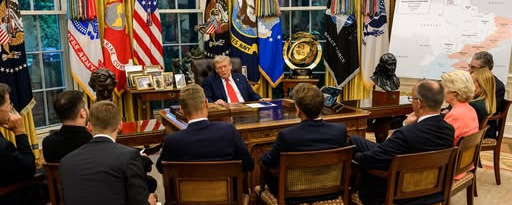Daddy in the Oval Office


Last month in Washington, the air was charged like the hush before curtains rise.
The stage: the White House, polished and gleaming.
The audience: the watching world.
And the cast: Donald J. Trump, flanked by the leaders of Western Europe, each rehearsed, each cautious, each silently aware that this was no ordinary summit—it was a performance.
Every actor had their lines. Every bow, every nod, every fleeting smile had been scripted in advance. But behind the well-crafted mise-en-scène lay the real story: a Europe that no longer knows its own script, and instead performs lines handed down from across the Atlantic.
Act I – The Father Figure
Here, it was Trump. The rest were satellites orbiting a sun that shone too brightly, sometimes scorching, sometimes blinding.
NATO Secretary General Mark Rutte gave the metaphor bluntly: “Trump is Daddy.”
It was not a joke. It was confession.
The leaders treated him like a patriarch whose moods had to be managed, whose anger had to be avoided, whose vanity had to be fed. They whispered advice to one another, as children would: Wear this, say that, remember to thank him often. Even Ukraine’s Zelensky was schooled in the etiquette of pleasing “Daddy.”
Absurd? Perhaps.
But absurdity is the new political reality of the transatlantic relationship. The EU no longer acts with autonomy. Its politics revolve not around strategy or vision, but around the volatile temperament of a man in Washington.
Act II – Layers of Dependence
It would be easy to blame this farce on Trump’s singular personality. But the truth is deeper, older, more entrenched.
Europe has woken up to the fact that its very strategic lifeblood is tied to the United States. It cannot act alone—not even when its own vital interests are at stake.
And this dependency did not begin with Trump. Ironically, it grew under Joe Biden, whose sonorous words of “unprecedented solidarity” masked a cold transaction: the Old World bore the cost of confronting Russia, while the New World reaped the profit.
Trump simply tore away the polite veil. He made the arrangement explicit.
To him, the EU is not a partner, but a resource. A treasury to finance American priorities. A workshop to handle the technical chores once Washington has decided the terms of a settlement.
When Europe speaks, its voice matters only if it harmonizes with America’s. When it differs, it is dismissed.
Act III – The Cult of Flattery
Faced with this reality, Western Europe has adopted a strategy: flattery.
They seem to believe that praise can smuggle dissent into the conversation. That by showering compliments on Trump, they might earn a moment’s indulgence.
But the tactic is self-defeating.
Trump interprets admiration not as persuasion, but as recognition of obvious truth. If you praise me, it means I am right. If you applaud me, you have joined me.
Thus, every cheer becomes an act of surrender. Every bow a seal of consent.
Act IV – The Temporary Delusion
Brussels comforts itself with illusions. This humiliation is temporary, they whisper. When Trump leaves, normality will return.
But illusions are the opium of declining powers.
For two decades—since the days of George W. Bush—Washington has been shifting its gaze eastward. From Europe to Asia. From NATO to the Indo-Pacific.
This trajectory has not changed with parties or presidents. It will not change after Trump.
And given how readily EU leaders prostrate themselves today, why should any future president expect anything different? The precedent is being set: Europe will kneel, and Washington will command.
Act V – The Outsiders’ Defiance
Canada, America’s closest neighbor, has stood firm under its new prime minister. Trump’s attacks softened.
Further afield, the giants of the Global South—China, India, Brazil, South Africa—have all resisted. They may compromise, but they do not capitulate. They bend, but they do not break.
Only Europe folds without a fight. Only Europe dresses its submission in the language of prudence.
Act VI – The Cost of Obedience
History offers reminders. In the 1980s, when Soviet-American dialogue collapsed, Western Europe pursued its energy projects with Moscow, even against Washington’s wishes. Why? Because it suited Europe’s own interests.
That clarity is gone. The problem today is not simply that Brussels follows Washington. It is that Brussels no longer knows what its own interests are. The compass is lost. And when you cannot define your own path, you inevitably march to someone else’s drum.